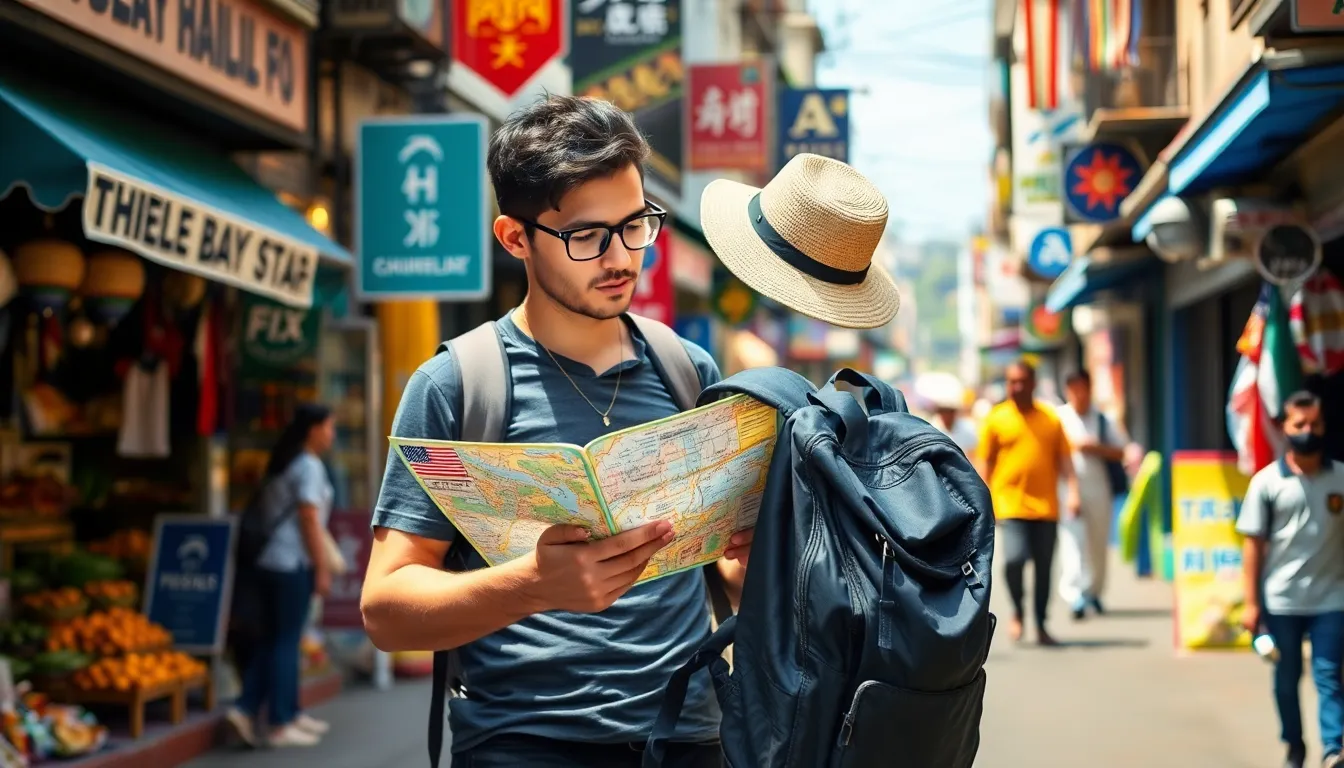Traveling should be an adventure, not a game of dodgeball with danger. In a world full of exciting destinations and hidden gems, it’s easy to get swept away by wanderlust. But before packing those bags, it’s crucial to embrace some cautious travel habits. After all, no one wants to return home with a souvenir of a nasty stomach bug or a wallet lighter than their travel spirit!
Table of Contents
ToggleUnderstanding Cautious Travel Habits
Cautious travel habits enable safer and more enjoyable experiences. Prioritizing safety ensures that adventures do not turn into disasters.
Importance of Safety in Travel
Safety remains a critical element in any travel plan. Travelers must recognize that unexpected events can occur, including accidents or theft. Ensuring awareness of surroundings plays a significant role in preventing situations that can compromise wellbeing. Following safety protocols can reduce risks considerably. Keeping emergency contacts readily available provides peace of mind. Arranging travel insurance safeguards against financial losses due to unforeseen incidents. Prioritizing safety can transform a trip into a memorable experience instead of a traumatic one.
Common Risks to Consider
Awareness of common risks significantly helps in avoiding potential pitfalls. Health issues often emerge as a major concern when traveling. Dehydration, foodborne illnesses, or inadequate vaccinations can affect travelers’ wellbeing. Additionally, loss or theft of belongings represents another common risk. Losing passports, money, or electronic devices complicates travel significantly. Natural disasters also pose threats in certain regions; staying informed about local weather conditions is essential. Traffic accidents may arise due to unfamiliar driving environments. Identifying these risks ahead of time allows for better preparation and safeguards during travel.
Planning Your Trip

Planning a trip requires attention to detail and thorough preparation. When organizing travels, careful decisions ensure safety and enjoyment.
Researching Destinations
Researching destinations proves essential in avoiding unpleasant surprises. Begin by reviewing local customs and laws to respect cultural norms. Identify health risks associated with specific areas, such as the prevalence of foodborne illnesses. Travelers should also check for weather conditions, as extreme temperatures may impact activities. Utilize travel forums and reputable websites to gather insights from other travelers’ experiences. Recommendations on accommodations and transportation options contribute to informed choices. Staying updated on travel advisories and safety alerts provides additional peace of mind while exploring new places.
Creating an Emergency Plan
Creating an emergency plan ensures readiness for unanticipated events. Start by compiling contact information for local emergency services and your country’s embassy. Make a list of personal emergency contacts who can assist during crises. Inform family or friends about your travel itinerary, including accommodation details. Establish a communication plan in case of emergencies, utilizing mobile apps or international calling cards. Prepare a first aid kit with essential items like band-aids and medication. By anticipating potential challenges, travelers can navigate difficult situations with confidence and efficiency.
Packing Smart
Packing smart contributes significantly to maintaining safety during travel. Thoughtful preparation reduces stress and enhances the overall experience.
Essential Safety Gear
Safety gear always makes a traveler’s journey smoother. First aid kits should include band-aids, antiseptic wipes, and pain relievers. Portable phone chargers provide backup communication during emergencies. Personal safety items, like a whistle or pepper spray, offer an added layer of protection. Additionally, face masks and hand sanitizers help prevent health risks, especially in crowded areas. Packing these essentials ensures travelers are ready for unexpected situations.
Minimizing Luggage
Minimizing luggage simplifies travel significantly. Travelers benefit from packing light as it increases mobility and reduces the risk of lost items. Carefully choosing versatile clothing pieces helps create multiple outfits with fewer items. Focusing on personal essentials and travel documents streamlines packing efforts. Additionally, using packing cubes can enhance organization within bags. Prioritizing lightweight materials contributes to a more enjoyable travel experience.
Staying Aware While Traveling
Maintaining awareness during travel enhances safety and enjoyment. Travelers benefit from being vigilant about their environment.
Paying Attention to Surroundings
Surroundings often provide crucial context about safety. Travelers should observe local behavior, noting any unusual activity. Awareness of exits and local emergency services can aid in crises. Familiarity with nearby landmarks helps orient oneself in unfamiliar areas. A traveler who keeps an eye on their belongings reduces the risk of theft. Staying alert in crowded places minimizes the chances of pickpockets. Understanding local customs and laws proves essential for navigating social dynamics. Engaging with locals can provide valuable insights and increase safety. Each observation contributes to a safer experience.
Trusting Your Instincts
Instincts often reflect knowledge and awareness gained through experience. A traveler who feels uncomfortable in a situation should prioritize moving to a safer area. Listening to gut feelings can prevent unnecessary risks. They might notice signs of distress or concern in others, prompting caution. Evaluating unfamiliar surroundings with skepticism helps in decision-making. Avoiding overly isolated places, especially at night, enhances safety. Trusting oneself leads to better choices, contributing to a positive travel experience. Staying connected to personal feelings enables travelers to navigate potential dangers effectively. Each instinct plays a role in shaping a safe journey.
Adapting to Changes
Adapting to changes during travel is essential for a secure and enjoyable experience. Flexibility allows travelers to respond effectively to unforeseen circumstances.
Being Flexible with Plans
Travelers often encounter unexpected changes. Last-minute flight delays or cancellations require quick adjustments. Modifying itineraries can lead to discovering new opportunities. Being open to alternative accommodations or local activities enhances travel experiences. Research demonstrates that adaptable travelers report higher satisfaction levels. Using travel apps can ease changes by providing real-time updates and options. Embracing a flexible mindset prepares travelers for any situation, ensuring enjoyment even when plans shift unexpectedly.
Handling Unexpected Situations
Unexpected situations can arise, regardless of preparation. Whether it’s a sudden illness or lost luggage, remaining calm is crucial. Employing a practical approach helps manage stress. Keeping important items, such as passports and tickets, in a secure location aids in retrieval. Having a plan for emergencies greatly enhances confidence. Contacting local authorities or seeking assistance from hotel staff can provide valuable support. Staying connected with travel companions ensures everyone is informed and safe. By addressing challenges head-on, travelers foster resilience and create memorable experiences.
Conclusion
Cautious travel habits empower individuals to explore the world while minimizing risks. By prioritizing safety and preparation travelers can enjoy their adventures with peace of mind. Staying aware of surroundings and adapting to unexpected situations enhances not only security but also the overall experience.
Smart packing and thorough research contribute to a smoother journey while maintaining flexibility allows for the discovery of new opportunities. With the right mindset and precautions in place travelers can navigate challenges confidently and create lasting memories. Embracing these practices ensures that travel remains a source of joy and growth rather than anxiety.



